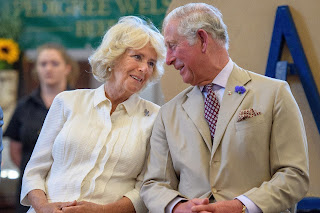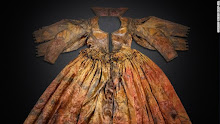With the release this month of season five of Peter Morgan's The Crown—and its emphasis on the next generation: the marriages, affairs, and divorces of three of Queen Elizabeth's children, especially spotlighting Charles and Diana—here's an excerpt from my in-progress book, The Spiritual Mission of a Princess, with notes on 'love.' As royal archetypes, were Charles and Diana simply a mismatched couple or was it a "karmic-setup"...with some divine intervention to show the world the way of the heart?
~ WHATEVER 'IN LOVE' MEANS ~
Through the ages, history shows that members of royalty—including Charles, Prince of Wales—“was not encouraged or expected to follow their hearts into marriage,” as author Caroline Weber wrote in her book review of The Diana Chronicles. It was dynastic duty first: a decision about which marital alliance would best serve the realm and which eligible woman would be most likely to produce a male heir. It was about power, ownership, control.
Since the desire of one’s heart was not part of the equation in this extremely patriarchal system of marriage—where little value was put on love—then if you happened to be in love with someone who wasn’t suited for the job of royal wife or husband, consequently your lover was either forgotten or set aside for later affairs. This was just the way it was, until it wasn’t.
~ ~ ~
“In the history of the human race, the idea of romance as the prelude to marriage is very rare,” Alistair Cooke wrote in “The Quest for a Royal Bride” in a July 1981 Parade magazine article featuring the upcoming wedding of Charles and Diana. “It must come as a shock to many people to be reminded that today most marriages, high and low, in the great majority of countries, are arranged, and that the choosing is not done by the partners,” the British historian continued. “It is true, in a particular sense, of royalty. For hundreds of years, love has been the least essential element of a royal marriage. There are certain precise conditions. Once these are met, if the partners also come to love each other, so much the better.” And declaring only days before their wedding, in his famously lighthearted way, Cooke said that if Charles and Diana indeed loved each other, it would be considered “a happy accident.”
 |
| Engagement photo,left, Diana & Charles, right "The Crown" season four |
As writer and humorist Nora Ephron said: “You can never know the truth of anyone’s marriage, including your own.” Underneath all the soap opera of the Wales’ arranged marriage (which pretended it was not), we don’t know much about the moments of sweetness, love and support that both Charles and Diana said were there. But we do know there was turmoil—and duplicity. Historically, in the times when arranged marriages were more typical than not, it was accepted as normal for royal and aristocratic men to have a discreetly-handled lover—and Charles took advantage of the system. But in the changing social culture of the late-twentieth century (including the evolving women’s movements), compounded by the tabloid press now exposing the private lives of royals, it all seemed hypocritical and vastly out-of-date. And the young Diana was having no part of the hypocrisy! “For the first time this century,” as feminist author Beatrix Campbell wrote in 1998, “a woman called a future king to account for his behavior as a man.” Diana not only denounced the archaic monarchic code of “men will be men” (and the one where women stay quiet, don’t complain so not to rock the royal boat), but exposed the similar double-standard code of the patriarchy held by many men around the world.
There were probably many feelings and emotions that pushed Diana to go public about the disappointments of her marriage. There was hurt and jealousy over her husband’s infidelity, anger and disappointment, perhaps embarrassment. But underneath it all, I’d say there was the heart-achingly desire to be loved. (If not by her husband, then at least by her sympathetic public.)
Nevertheless, “every relationship I have ever looked at Astrologically,” Steffan Vanel states, “can be seen as a ‘karmic set-up’ revealing what the evolving souls knew they would do to each other.” And it was true about Charles and Diana. “Conflictual [sic] as well as complimentary,” wrote Martha Caldwell about the astrological karma between Diana and Charles according to Vanel’s research. “Diana and Charles were perfect for each other in light of what they came to Earth to learn in this lifetime. Much of Diana’s karma surrounds her experience of relationship, so it is with Charles that she worked on her most troublesome issues.” Vanel picked up from there: “The karmic lesson for Charles has been to look inside himself to know who he really is. Diana was the perfect manifestation of a force which would pull the rug out from under his over-identification with role in his life to help him in his own evolution.”
~ ~ ~
Prince Charles caused quite a stir with his “whatever ‘in love’ means” statement during an interview with his young fiancée. But philosopher and writer Alain de Botton would have understood Charles’ frustration. Since his first book, a novel titled On Love, de Botton combined the theme of love and relationship in his writing and teaching, but not in a conventional way. The novel’s first line reads: “Every fall into love involves the triumph of hope over knowledge.”
“Compatibility,” de Botton later wrote, “is an achievement of love. It cannot be its precondition.” His essay “Why You Will Marry the Wrong Person,” explained On Being radio host Krista Tippett, “was, amazingly, the most-read article in the New York Times in the news-drenched year of 2016. As people, and as a culture, de Botton says, we would be much saner and happier if we reexamined our very view of love. Nowhere do we realistically teach ourselves and our children,” Tippett continued, “how love deepens and stumbles, survives and evolves over time, and how that process has much more to do with ourselves than with what is right or wrong about our partner.”
We are inside a profoundly evolving world; a fundamental consciousness shift is occurring and the nature of our relationships and what we desire from them are shifting as well. But many people have been stuck in the old paradigm, expecting satisfying relationships inside an outdated model. If we are indeed all here to grow and evolve and assist with each other’s evolution, then it’s time to open our hearts—wide with generosity and compassion—so we see each other with love. And sometimes our guides into a new way of being related are unexpected ones. During her life within the archaic institution of the British monarchy and its duty-bound royal family, Princess Diana called out its hard-edged, mindset of “duty over love” and declared that she led with the heart, not with the head, and that love, real love, must always come first. It was a lesson passed on to her sons, as well as to her former husband.
So whether in a romantic relationship or just living day-to-day out in the world, there’s simply this, in the words of Marianne Williamson: “You are loved, and your purpose is to love.” ~



.jpg)

















No comments:
Post a Comment